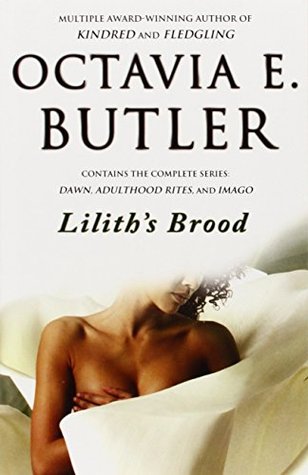Book Notes: Lilith's Brood
Lilith's Brood
by Octavia Butler
Read
Aug 6, 2020 -
Aug 20, 2020
⭐⭐⭐⭐⭐
This is a collected edition of Butler’s Xenogenesis trilogy, containing the books Dawn, Adulthood Rites and Imago. After a nuclear war on Earth, an alien species, the Oankali, comes to save humans by merging the two species. The Oankali are a very unique alien culture – one with three genders, family/mating units of at least three individuals, a natural ability to perform genetic engineering, and a biological drive to mix their genes with those of other species. The books tell the story of Lilith, a Black woman that becomes the first human to form a family unit with the Oankali.
These books explore themes of what it means to be human (and Other), individual agency and its interplay with collective needs, race, and the human tendency to hierarchy. I found myself frowning, at times, at the biologically deterministic Oankali worldview. The characters are complex and full of contradictions and not easily lovable, but understandable and very likable, perhaps because of the very familiar – human – flavor of their flaws.
Book highlights
When they’re finished with us there won’t be any real human beings left.
They wanted, Lilith thought, only to be let alone. That was all many people had wanted before the war. It was the one thing they could not have, then or now.
“Trade means change. Bodies change. Ways of living must change. Did you think your children would only look different?”
He could accept without understanding. Once he had seen that a strange thing did no harm, he no longer feared it.
Akin sat, torn, wanting to speak, yet not daring to, almost sick himself about the bleeding man. It was wrong to allow such suffering, utterly wrong to throw away a life so unfinished, unbalanced, unshared.
This man was curious, too, but it was like the kind of curiosity that made some Humans turn over rotting logs—so they could enjoy being disgusted by what lived there.
“Human beings fear difference,” Lilith had told him once. “Oankali crave difference. Humans persecute their different ones, yet they need them to give themselves definition and status. Oankali seek difference and collect it. They need it to keep themselves from stagnation and overspecialization."
The Human Contradiction again. The Contradiction, it was more often called among Oankali. Intelligence and hierarchical behavior. It was fascinating, seductive, and lethal. It had brought Humans to their final war.
The Human Contradiction held them. Intelligence at the service of hierarchical behavior.
Now there was nothing to do but wait. Wait and know that when Humans disagreed, they sometimes fought, and when they fought, all too often they killed one another.
Thus, they had been given first a guest house, then a guest area. In that area they had built their dead houses of cut wood and woven thatch. They used fire for light and cooking and occasionally they burned down one of their houses.
There were times when I envied Humans their ability to shut off their sight by closing their eyes, shut off their understanding by some conscious act of denial that was beyond me.
Humans said one thing with their bodies and another with their mouths and everyone had to spend time and energy figuring out what they really meant. And once we did understand them, the Humans got angry and acted as though we had stolen thoughts from their minds.
But the ooloi perceived all that a living being said—all words, all gestures, and a vast array of other internal and external bodily responses. Ooloi absorbed everything and acted according to whatever consensus they discovered. Thus ooloi treated individuals as they treated groups of beings. They sought a consensus.
Humans had evolved from hierarchical life, dominating, often killing other life. Oankali had evolved from acquisitive life, collecting and combining with other life. To kill was not simply wasteful to the Oankali. It was as unacceptable as slicing off their own healthy limbs.
Tags: books
